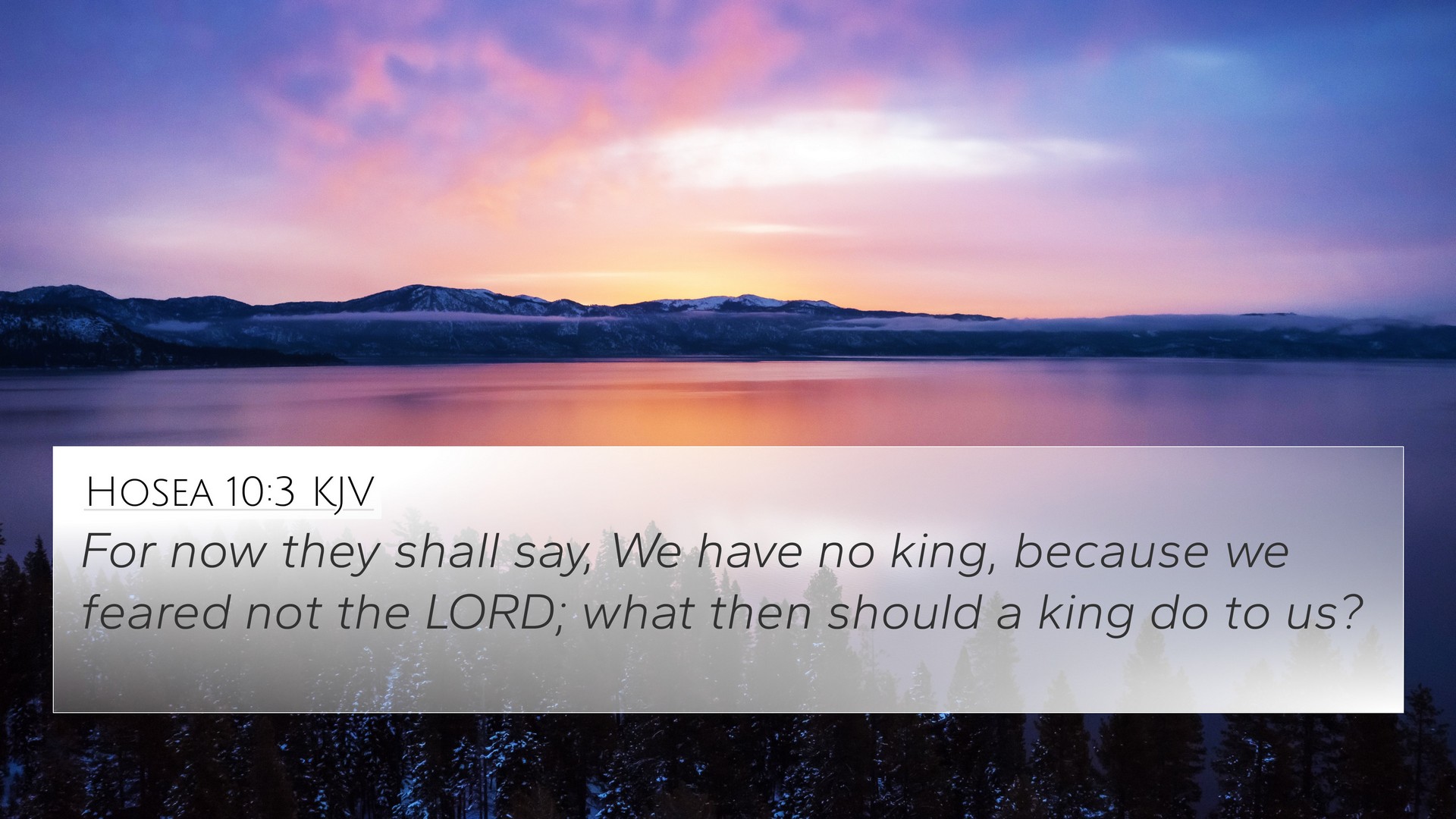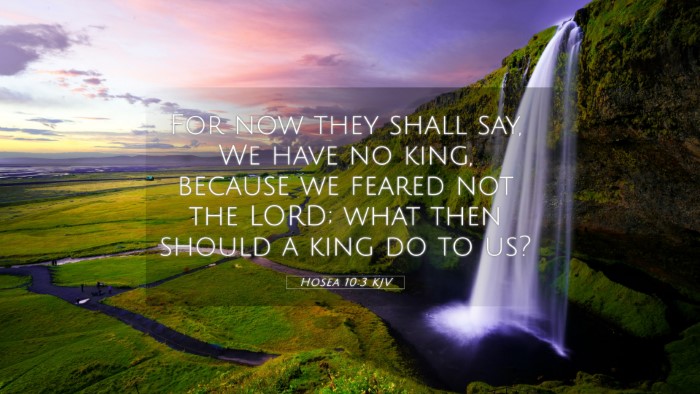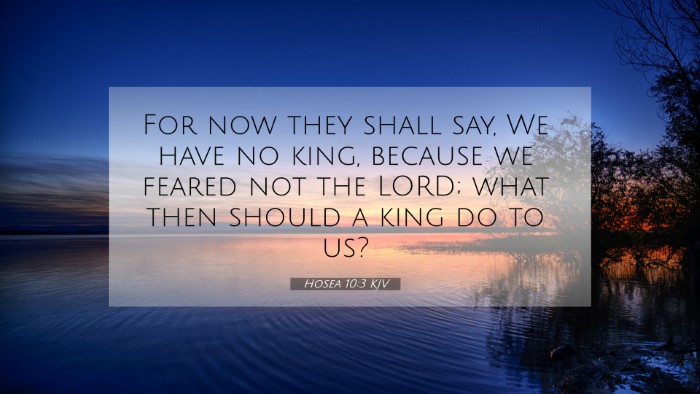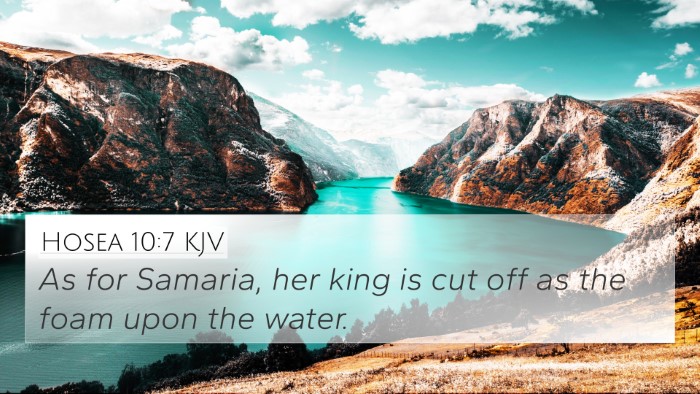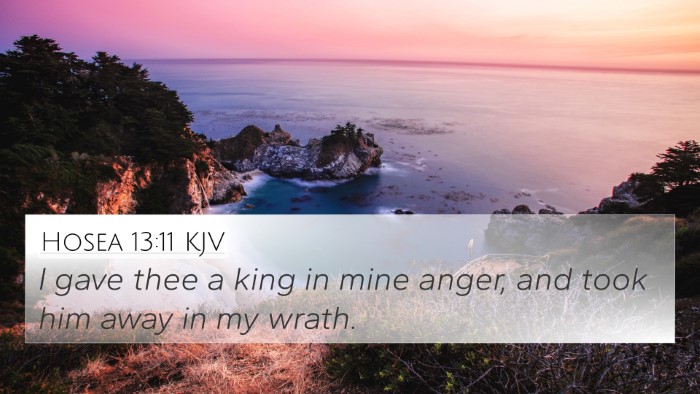Old Testament
Genesis Exodus Leviticus Numbers Deuteronomy Joshua Judges Ruth 1 Samuel 2 Samuel 1 Kings 2 Kings 1 Chronicles 2 Chronicles Ezra Nehemiah Esther Job Psalms Proverbs Ecclesiastes Song of Solomon Isaiah Jeremiah Lamentations Ezekiel Daniel Hosea Joel Amos Obadiah Jonah Micah Nahum Habakkuk Zephaniah Haggai Zechariah MalachiHosea 10:3 Similar Verses
Hosea 10:3 Cross References
For now they shall say, We have no king, because we feared not the LORD; what then should a king do to us?
Uncover the Rich Themes and Topics of This Bible Verse
Listed below are the Bible themes associated with Hosea 10:3. We invite you to explore each theme to gain deeper insights into the Scriptures.
Hosea 10:3 Cross Reference Verses
This section features a detailed cross-reference designed to enrich your understanding of the Scriptures. Below, you will find carefully selected verses that echo the themes and teachings related to Hosea 10:3 KJV. Click on any image to explore detailed analyses of related Bible verses and uncover deeper theological insights.

Hosea 10:15 (KJV) »
So shall Bethel do unto you because of your great wickedness: in a morning shall the king of Israel utterly be cut off.
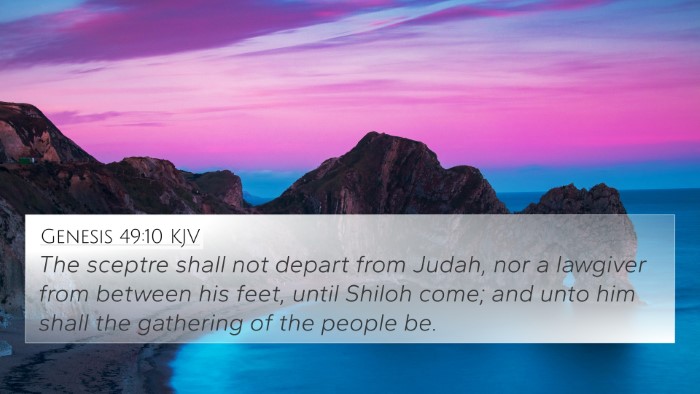
Genesis 49:10 (KJV) »
The sceptre shall not depart from Judah, nor a lawgiver from between his feet, until Shiloh come; and unto him shall the gathering of the people be.
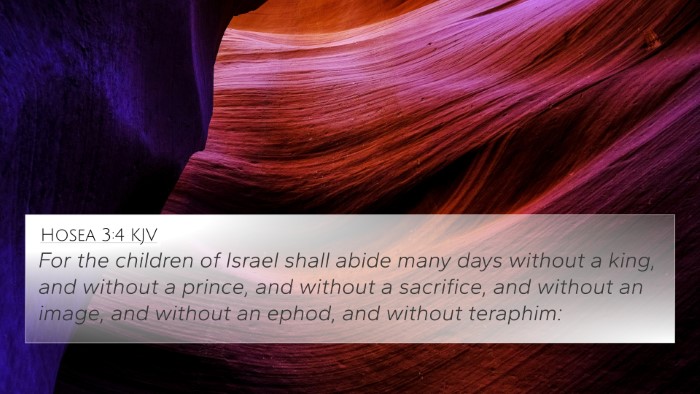
Hosea 3:4 (KJV) »
For the children of Israel shall abide many days without a king, and without a prince, and without a sacrifice, and without an image, and without an ephod, and without teraphim:
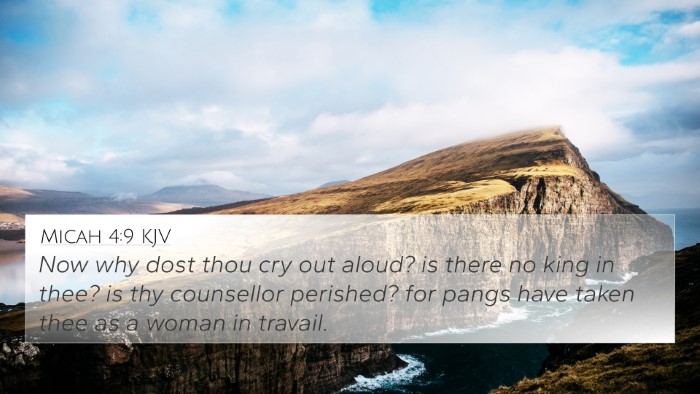
Micah 4:9 (KJV) »
Now why dost thou cry out aloud? is there no king in thee? is thy counsellor perished? for pangs have taken thee as a woman in travail.
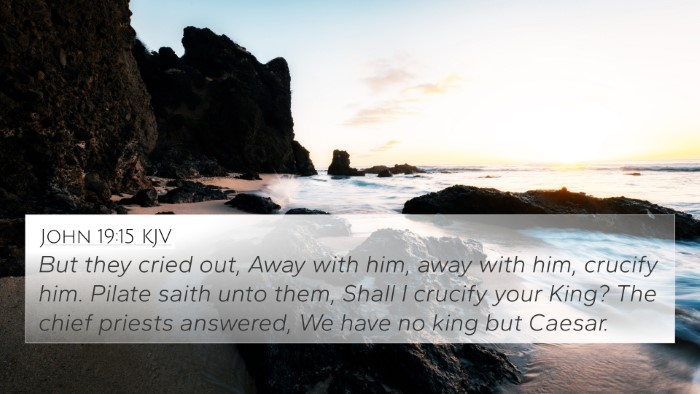
John 19:15 (KJV) »
But they cried out, Away with him, away with him, crucify him. Pilate saith unto them, Shall I crucify your King? The chief priests answered, We have no king but Caesar.
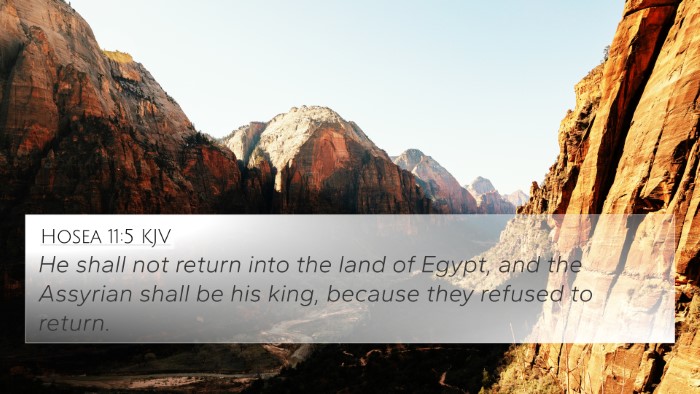
Hosea 11:5 (KJV) »
He shall not return into the land of Egypt, and the Assyrian shall be his king, because they refused to return.
Hosea 10:3 Verse Analysis and Similar Verses
Understanding Hosea 10:3
Hosea 10:3 states, "For now they will say, 'We have no king, for we do not fear the Lord; and a king—what could he do for us?'" This verse highlights the disconnection between the people of Israel and their relationship with God, emphasizing their lack of faith and understanding of true leadership.
The context of this verse occurs during a time of national crisis for Israel, where idolatry flourished, and the people's trust in God waned. This breakdown led to a questionable sense of security, as noted by commentaries from Matthew Henry, Albert Barnes, and Adam Clarke.
Commentary Insights
-
Matthew Henry:
Henry reflects on how the Israelites, beset by their sins, find themselves in disarray, questioning the efficacy of their earthly kings. They realize that without the right relationship with God, no earthly ruler can provide true safety or guidance.
-
Albert Barnes:
Barnes elucidates that the absence of a king is a reflection of the people's spiritual state. They are void of leadership because they do not fear God, resulting in a questioning of the king's role—honoring no divine authority leads to a sense of hopelessness.
-
Adam Clarke:
Clarke emphasizes the futility of human kingship divorced from divine guidance. He notes that without reverence for God, human governance becomes ineffective, which ultimately leads to societal collapse and despair among the people.
Bible Verse Cross-References
This verse connects with several other passages that deepen our understanding of the themes present in Hosea 10:3. Here are some notable cross-references:
- 1 Samuel 8:7: God warns Samuel about the people's rejection of divine authority in favor of a human king.
- Proverbs 14:34: "Righteousness exalts a nation, but sin is a reproach to any people," highlighting the relationship between governance, morality, and divine favor.
- Hosea 8:4: Discusses appointing kings and princes contrary to God's will.
- Jeremiah 2:13: Shows God as the fountain of living waters, contrasting with broken cisterns, referring to misplaced trust.
- Psalm 146:3: "Do not put your trust in princes, in human beings, who cannot save," reinforcing the futility of reliance on human leadership without divine wisdom.
- Isaiah 30:1: Encourages dependence on the Lord rather than seeking counsel from outside sources.
- Micah 3:5: Critiques prophets who mislead people, promoting the idea of false security in leadership.
- Luke 19:14: Reference to those who reject the ruling of the Lord, aligning with themes of rebellion against divine governance.
- Matthew 6:24: Stresses the impossibility of serving two masters, urging loyalty to God above all.
- James 4:4: Indicates that friendship with the world is enmity against God, warning against misplaced allegiances.
Thematic Bible Verse Connections
The themes in Hosea 10:3 relate closely to the broader biblical narrative concerning:
- Divine Authority: The rejection of God as the ultimate authority leads to human chaos, as seen in passages like Proverbs 21:1 ("The king's heart is in the hand of the Lord; He directs it like a watercourse wherever He pleases.").
- The Consequence of Sin: Sin leads to disobedience and ultimately disconnection from God's blessing, as seen in Romans 6:23 ("For the wages of sin is death...").
- Leadership and Guidance: The importance of seeking divine guidance in leadership structures, exemplified in 1 Chronicles 12:32 where understanding the times was highlighted as crucial for Israel.
Applications for Cross-Referencing Biblical Texts
For those seeking to deepen their understanding of biblical texts through cross-referencing, the following tools and techniques can enhance your study:
- Bible Concordance: These tools radically assist in finding relevant verses that may compare or reflect similar themes, ideas, or historical contexts.
- Bible Cross-Reference Guide: Utilize guides that organize verses thematically, allowing users to identify connections by topic or keyword.
- How to Use Bible Cross-References: Understand the historical and cultural backgrounds of verses to see how they speak to one another.
- Cross-Referencing Bible Study Methods: Implement methods that require one to actively seek and reflect on connections between passages during study sessions.
- Bible Chain References: Create chains of verses that flow from one to another, building a cohesive narrative or theological concept through scripture.
Conclusion
In summary, Hosea 10:3 serves as a poignant reminder of the importance of recognizing God as the ultimate authority and the source of true safety. The insights gathered from noted biblical commentaries, along with relevant cross-references, enrich our understanding of the text. Engaging in the recommended cross-referencing tools will further assist in exploring the interconnectedness of scripture, providing clarity and depth as we navigate the complexities of Biblical narratives.
